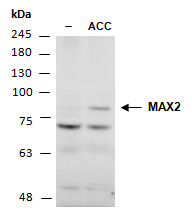Abiocode Logo
Products
Contact Us
- Telephone:
1-818-707-0309 - E-Mail:
Abiocode@Abiocode.com
R3557-1 - MAX2 (C) Antibody, Rabbit Polyclonal
|
Quantity: 100 ul Application: WB Predicted I Observed M.W.: 77 kDa Uniprot ID: Q9SIM9
Background: F-box protein MAX2 is a component of SCF(ASK-cullin-F-box) E3 ubiquitin ligase complexes, which may mediate the ubiquitination and subsequent proteasomal degradation of target proteins. MAX2 promotes the senescence. MAX2 is necessary for responses to strigolactones and karrikins. MAX2 also contributes to the selective repression of axillary shoots and moderates the branching by regulating negatively the auxin transport in primary stems, in an AXR1-independent manner. Furthermore, MAX2 is required for the progression of leaf senescence mediated by methyl jasmonate. Other Names: F-box protein MAX2, ATMAX2, MAX2, MORE AXILLARY BRANCHES 2, ORE9, ORESARA 9, PLEIOTROPIC PHOTOSIGNALING, PPS, F-box/LRR-repeat protein 7, Protein KARRIKIN INSENSITIVE 1, Protein MORE AXILLARY BRANCHING 2, Protein ORESARA 9, KAI1, FBL7 Source and Purity: Rabbit polyclonal antibodies were produced by immunizing animals with a GST-fusion protein containing the C-terminal region of arabidopsis thaliana MAX2 (At2g42620). Antibodies were purified by affinity purification using immunogen. Storage Buffer and Condition: Supplied in 1 x PBS (pH 7.4), 100 ug/ml BSA, 40% Glycerol, 0.01% NaN3. Store at -20 °C. Stable for 6 months from date of receipt. Species Specificity: Arabidopsis thaliana Tested Applications: WB: 1:500-1:2,000 (detect endogenous protein*) *: The apparent protein size on WB may be different from the calculated M.W. due to modifications. Product Data:
|
